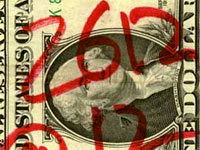 Money Habits That Are Illegal
Money Habits That Are Illegal
Forgery. Loan fraud. Counterfeiting. These and other financial crimes might seem like a far cry from most people’s everyday lives. But it’s surprisingly easy to adopt a dicey financial habit under the guise of “everyone does it,” “I was just trying to help” or “it seemed like a good idea at the time” only to discover later that what you’ve done is in fact, illegal. The odds of getting caught may seem slim, but the consequences and penalties can be harsh. Here are six money habits you should quit now.
1. Signing Someone Else’s Name on a Check
 Signing someone else’s name on a check is generally considered forgery and would be illegal in most states, according to Carol Kaplan, a spokeswoman for the American Bankers Association in Washington, D.C. But suppose an adult child signs an elderly parent’s name because the parent is incapacitated or a parent signs a child’s name because the child is away at college. Guess what? Those signatures are still forgeries, unless a power of attorney is in effect.
Signing someone else’s name on a check is generally considered forgery and would be illegal in most states, according to Carol Kaplan, a spokeswoman for the American Bankers Association in Washington, D.C. But suppose an adult child signs an elderly parent’s name because the parent is incapacitated or a parent signs a child’s name because the child is away at college. Guess what? Those signatures are still forgeries, unless a power of attorney is in effect.
“In most cases, it’s on behalf of a loved one who probably isn’t going to object, but people should know that that’s forgery,” Kaplan says.
2. Using Someone Else’s Identity to Obtain Credit
 The use of someone else’s name and identity to obtain credit is an obvious no-no. But suppose — and Kaplan says she’s heard tales of such situations — a parent whose credit has been ruined uses a child’s name and identity to open new credit accounts. Illegal? You bet.
The use of someone else’s name and identity to obtain credit is an obvious no-no. But suppose — and Kaplan says she’s heard tales of such situations — a parent whose credit has been ruined uses a child’s name and identity to open new credit accounts. Illegal? You bet.
“It’s illegal to pose as someone else,” Kaplan says, “but there is also a moral question: Do you want to punish your child and wreck their credit as well?”
3. Lying on a Home Loan Application
 Homebuyers and homeowners who want to refinance may be tempted to inflate their income or hide some of their debts to better their chances of a “yes” from the lender. But lying on a loan application is fraud, and lenders do check up on applicants’ information, according to Kaplan.
Homebuyers and homeowners who want to refinance may be tempted to inflate their income or hide some of their debts to better their chances of a “yes” from the lender. But lying on a loan application is fraud, and lenders do check up on applicants’ information, according to Kaplan.
“You should always be honest,” she says. “We all go through difficult financial periods, and it’s tempting to want to fudge, but if you get caught, it’s going to lead to huge headaches, and you will sleep better at night knowing that you aren’t living with a lie.”
4. Writing ‘Bad’ Checks
 Many banks offer overdraft protection that kicks in if you write a check for more than the balance of your account. But writing a check that you know is no good is illegal. The risk isn’t negligible: Kaplan says some people do get prosecuted for writing bad checks.
Many banks offer overdraft protection that kicks in if you write a check for more than the balance of your account. But writing a check that you know is no good is illegal. The risk isn’t negligible: Kaplan says some people do get prosecuted for writing bad checks.
“Not only are there criminal penalties involved, but you get put on a list of bad check writers. A lot of places won’t accept your checks, and you may have difficulty opening a bank account again because you’ve been labeled as a fraudster,” she says.
5. Copying U.S. Currency
 Color printers, scanners and copiers make it surprisingly easy for just about anyone to replicate U.S. or foreign currency. But it is, in fact, illegal to print your own money and try to spend it to buy goods or services.
Color printers, scanners and copiers make it surprisingly easy for just about anyone to replicate U.S. or foreign currency. But it is, in fact, illegal to print your own money and try to spend it to buy goods or services.
It’s OK to reproduce U.S. currency only if you follow the guidelines established by the U.S. Secret Service, according to Claudia Dickens, a spokeswoman for the U.S. Bureau of Engraving and Printing, a department of the U.S. Treasury in Washington, D.C.
“If you make a copy of currency, it has to be at least 150 percent larger than what you and I carry in our wallets or 75 percent of its normal size. If you make it in color, you can only do one side,” she says.
6. Defacing U.S. Currency
 U.S. currency isn’t designed to be run through the clothes washer, written on or masticated by pets. Yet while accidental damage to currency normally isn’t illegal, deliberate defacement is. Federal law prohibits any action that mutilates, cuts, defaces, perforates or glues together U.S. currency or otherwise renders bills unusable.
U.S. currency isn’t designed to be run through the clothes washer, written on or masticated by pets. Yet while accidental damage to currency normally isn’t illegal, deliberate defacement is. Federal law prohibits any action that mutilates, cuts, defaces, perforates or glues together U.S. currency or otherwise renders bills unusable.
“It really becomes illegal if you deface it in any way,” Dickens says. “When I say, ‘deface,’ that means you make it unusable. A merchant won’t accept it; if it’s been glued, it won’t fit into a vending machine.”
The law doesn’t offer specific examples of usability, but common sense should apply.
Did you know that if you subscribe to our website, you will receive email notifications whenever content changes or new content is added.
1. Enter your e-mail address below and click the Sign Me Up button.
2. You will receive an email asking you to confirm your intention of subscribing to our site.
3. Click the link in the email to confirm. That’s all there is to it! Note: if you wish to unsubscribe from our site, click the unsubscribe link at the bottom of the email you received.
Then indicate you no longer wish to receive our emails.
Thank You
Prisonbreakfreak.com Team